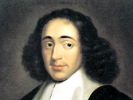
Correspondence, by Benedict de Spinoza, [1883], at sacred-texts.com

Correspondence, by Benedict de Spinoza, [1883], at sacred-texts.com
[Concerning the best method, by which we may safely arrive at the knowledge of things.]
Most learned Sir and Dearest Friend,—I have not been able hitherto to answer your last letter, received some time back. I have been so hindered by various occupations and calls on my time, that I am hardly yet free from them. However, as I have a few spare moments, I do not want to fall short of my duty, but take this first opportunity of heartily thanking you for your affection and kindness towards me, which you have often displayed in your actions, and now also abundantly prove by your letter.
I pass on to your question, which runs as follows: "Is there, or can there be, any method by which we may, without hindrance, arrive at the knowledge of the most excellent things? or are our minds, like our bodies, subject to the vicissitudes of circumstance, so that our thoughts are governed rather by fortune than by skill?" I think I shall satisfy you, if I show that there must necessarily be a method, whereby we are able to direct our clear and distinct perceptions, and that our mind is not, like our body, subject to the vicissitudes of circumstance.
This conclusion may be based simply on the consideration that one clear and distinct perception, or several such together, can be absolutely the cause of another clear and distinct perception. Now, all the clear and distinct perceptions, which we form, can only arise from other clear and distinct perceptions, which are in us; nor do they acknowledge any cause external to us. Hence it follows that the clear and distinct perceptions, which we form, depend solely on our nature, and on its certain and fixed laws; in other words, on our absolute power, not on fortune—that is, not on causes which, although also acting by certain and fixed laws, are yet unknown to us, and alien to our nature and power. As regards other perceptions, I confess that they depend chiefly on fortune. Hence clearly appears, what the true method ought to be like, and what it ought chiefly to consist in—namely, solely in the knowledge of the pure understanding, and its nature and laws. In order that such knowledge may be acquired, it is before all things necessary to distinguish between the understanding and the imagination, or between ideas which are true and the rest, such as the fictitious, the false, the doubtful, and absolutely all which depend solely on the memory. For the understanding of these matters, as far as the method requires, there is no need to know the nature of the mind through its first cause; it is sufficient to put together a short history of the mind, or of perceptions, in the manner taught by Verulam.
I think that in these few words I have explained and demonstrated the true method, and have, at the same time, pointed out the way of acquiring it. It only remains to remind you, that all these questions demand assiduous study, and great firmness of disposition and purpose. In order to fulfil these conditions, it is of prime necessity to follow a fixed mode and plan of living, and to set before one some definite aim. But enough of this for the present, &c.
Voorburg, 10 June, 1666.
360:1 I. B. has been identified by some with John Bredenburg, a citizen of Rotterdam, who translated into Latin (1675) a Dutch attack on the Tractatus Theologico-Politicus, but the tone of the letter renders this improbable. Murr and Van Vloten think that I. B. may be the physician, John Bresser, who prefixed some verses to the "Principles of Cartesian Philosophy."